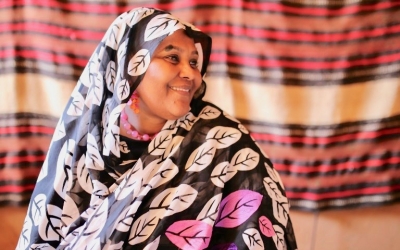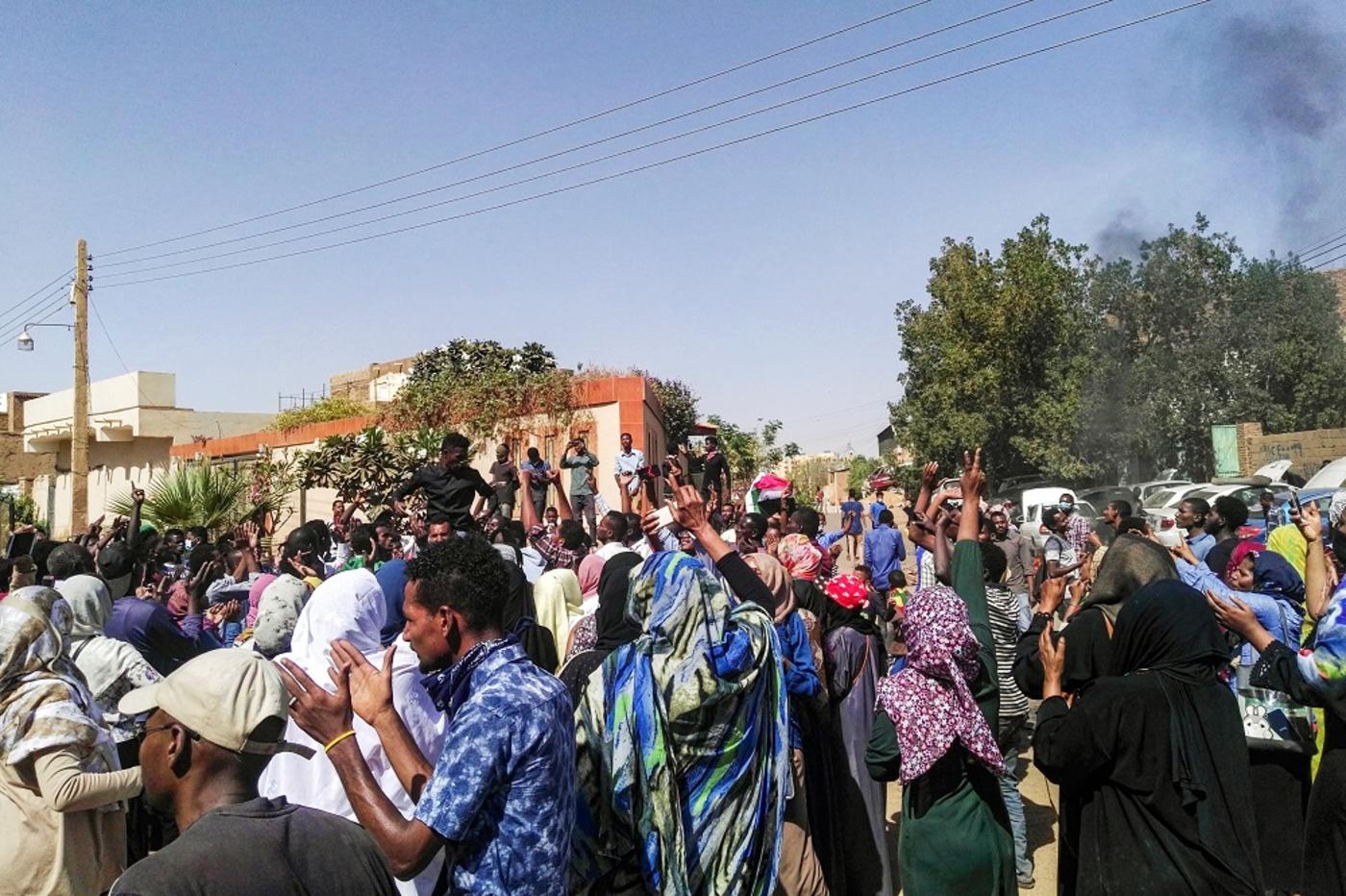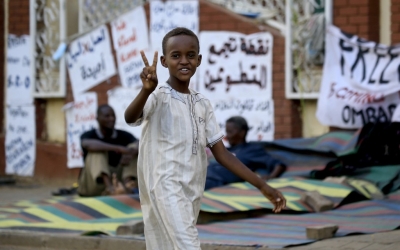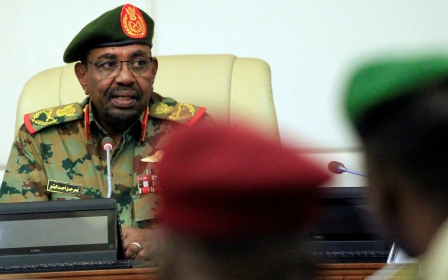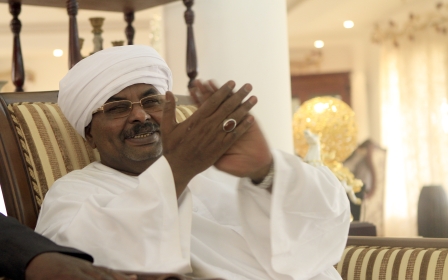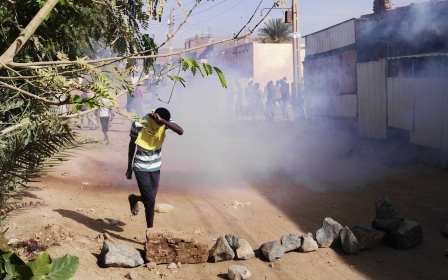Sudanese woman sentenced to be lashed has square named in her honour
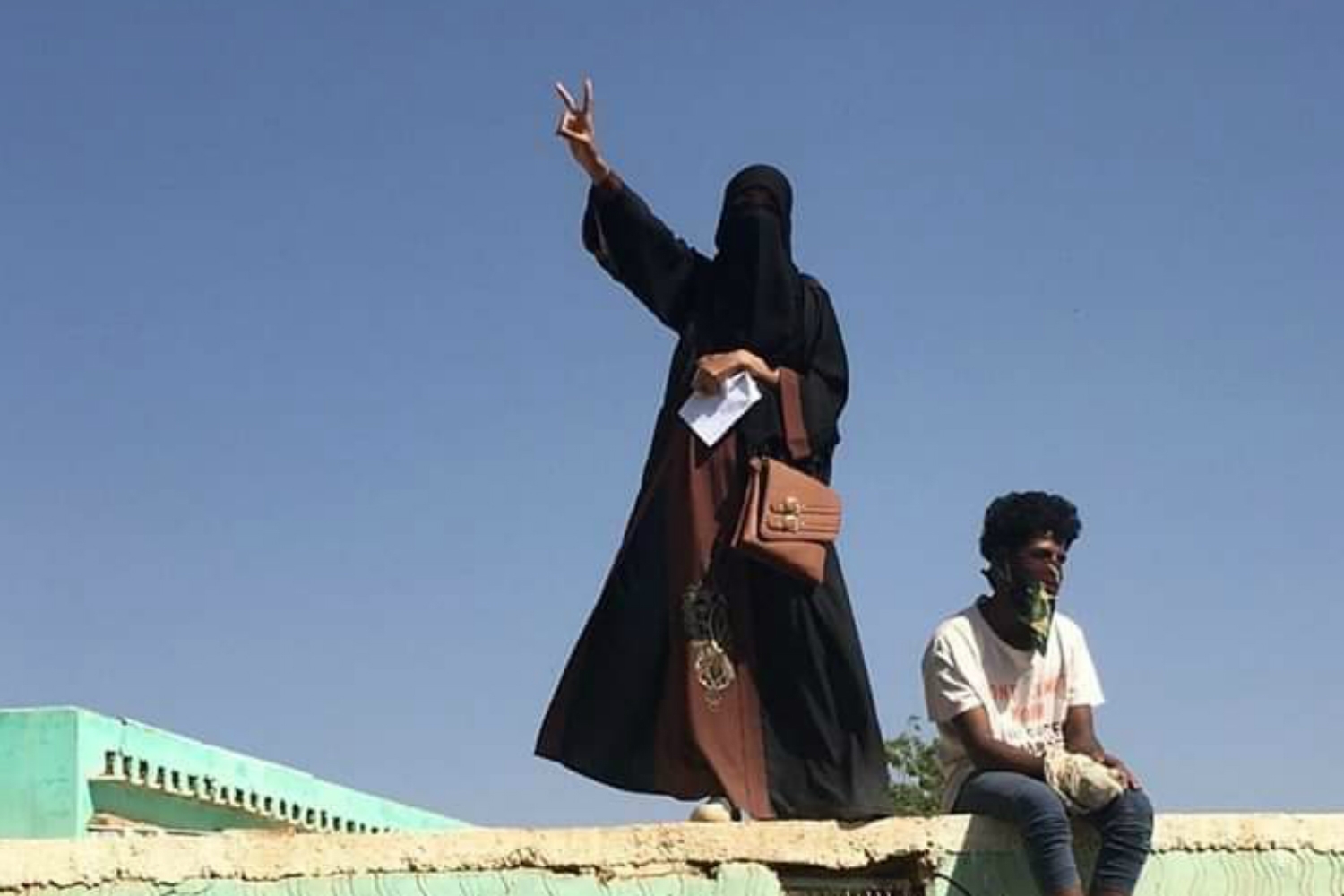
Sudanese protesters have celebrated the release of a prominent female activist who had been sentenced to be flogged by renaming a public square in a blockaded neighbourhood of Khartoum in her honour.
Muzan Abdul Samiaa was among nine young women who were convicted last week alongside four male protesters for playing a leading role in demonstrations against Sudan's president Omar al-Bashir in her home neighbourhood of Burri in the east of the capital.
The protesters were all sentenced to be flogged 20 times and jailed for one month under emergency laws announced by Bashir in response to the waves of protests that have been ongoing since December.
But the judgements provoked local and international condemnation, with Sudanese activists, lawyers and human rights organisations calling on the authorities to release the protesters and end their crackdown on dissent.
At least 870 people have been prosecuted in emergency courts since February, according to the pro-opposition Democratic Lawyers Alliance.
New MEE newsletter: Jerusalem Dispatch
Sign up to get the latest insights and analysis on Israel-Palestine, alongside Turkey Unpacked and other MEE newsletters
Others recently targeted include Mariam Sadiq al-Mahdi, the deputy chair of the opposition National Umma Party and daughter of leader Sadiq al-Mahdi, who was jailed on Sunday for one week for leading protests in Khartoum.
On Tuesday, a member of the protesters' defence team confirmed that their convictions had been overturned on appeal and that all 13 had been released.
"We hope that the same sentence won't be imposed again as the appeal court overturned it this time," Nasur Eldin Youssef told Middle East Eye.
Neighbourhood blockaded
Abdul Samiaa had been arrested after a photograph taken of her last Thursday making a victory gesture while standing on a wall in Burri was widely circulated by activists on social media, with many adopting it as their profile picture on Facebook.
Burri has been a flashpoint neighbourhood over the past three months, with demonstrations taking place on a near-daily basis despite at least three protesters being killed there by security forces in January.
Khalid Hussien, a member of the local protest organising committee, told MEE that the area had been blockaded by dozens of security vehicles and police trucks since January.
"Muzan Abdul Samiaa has become a real icon for the revolutionaries in Burri," he said. "We have honoured her brave efforts by naming the main square in the neighbourhood after her."
One of the nine women released on Monday night told MEE that she was relieved to be free but still fearful that the same punishments could be meted out to herself and other protesters in the future.
"It was a bad experience that provoked fear and anger because you know you are facing this humiliating punishment for doing something that is normal. It's been a nightmare that I hope will never be repeated in my life," said the 25-year-old, speaking on condition that her name was not published.
The sentencing of the nine women to be flogged on Thursday night had drawn additional attention when Bashir on Friday marked International Women's Day by announcing that all female detainees arrested for taking part in protests would be released.
Why are Sudanese protesting against their government?
+ Show - HideSudanese protests have evolved in the space of less than six months from complaints about bread prices to calls for long-term leader Omar al-Bashir to go and demands for a civilian-led transition to democracy.
Here's a summary of the key moments so far since the protests began.
19 December 2018: People take to the streets in the city of Atbara to protest against a government decision to triple the price of bread, torching a local ruling party office. By the next day protesters on the streets of Khartoum and other cities calling for "freedom, peace, justice". Police try to disperse the crowds, resulting in at least eight deaths. Dozens more will be killed in the weeks of protest that follow
22 February 2019: Sudanese President Omar al-Bashir declares a nationwide state of emergency. He swears in a new prime minister two days later, as riot police confront hundreds of protesters calling for him to resign
6 April: Thousands gather outside the army's headquarters in Khartoum, chanting "one army, one people" in a plea for the military's support. They defy attempts by state security forces to dislodge them and troops intervene to protect them
11 April: Military authorities announce they have removed Bashir and that a transitional military council will govern for two years. Despite celebrations at Bashir's demise, protest leaders denounce the move as a "coup" and the protesters remain camped outside army headquarters.
14 April: Protest leaders call on the military council to transfer power to a civilian government
20 April: Sudan's military rulers hold a first round of talks with protest leaders
27 April: The two sides agree to establish a joint civilian-military ruling council, but talks stall over differences in the composition of the council, with both sides demanding a a majority
15 May: With negotiators reported to be close to agreeing a three-year transition to civilian rule, military leaders suspend talks and insist protesters remove barricades outside the army's headquarters. Talks resume on 19 May but break down again on 20 May, with the opposition insistent that a civilian must head the transitional governing body
28 May: Thousands of workers begin a two-day strike to pressure the military rulers and call for civilian government
3 June: At least 35 people killed and hundreds injured, according to opposition-aligned doctors, as security forces firing live ammunition move to disperse the protest camp outside army headquarters
4 June: General Abdel Fattah al-Burhan, the head of the military council, announces that all previous agreements with protest leaders are scrapped and says elections will be held in nine months
Sara Abdul Galil, a spokesperson for the Sudanese Professional Association (SPA), a trade union coalition that has organised protests since December, said the government was deliberately targeting young women and using the threat of flogging because they were taking part in protests in large numbers.
"The government is currently in its weakest situation since it came to the power and has no solution to remain in power other than using violence against the protesters," said Galil.
"It's not strange for us that the government is threatening to use this extreme and humiliating punishment against the protesters, and especially against the women."
'I felt humiliated'
Flogging has long been used in Sudan against women in order to exclude them from public life and deter them from political activism, said Amira Osman, the secretary general of the No Repression Against Women Initiative.
"The Sudanese government is supposed to respect its international and regional obligations [to recognise rights for women]," Osman told MEE.
It was first used as a punishment by the British. Ever since it's been used as an oppressive tool by governments in Sudan
- Mohamed Omer Shomena
Osman said she had been sentenced to flogging herself in 2013 when she refused to cover her head. Flogging was used by the authorities against women's rights activists as part of a deliberate policy to isolate them from their communities, she added.
"I felt humiliated, but I insisted that I would not abandon the way I had chosen to dress. I preferred to be flogged than to cover my head," she said.
"As women, we face the bad experience of having laws like those of the Taliban imposed on us by the government of Sudan. That is why we have established this initiative to defend ourselves against these bad laws that humiliate women."
Mohamed Omer Shomena, a Sudanese legal expert, said that the punishment of flogging was used differently against men and women in Sudanese law.
Articles written into criminal law in 1991, two years after Bashir had seized power in a military coup backed by the Islamist National Islamic Front, allowed for courts to sentence women to be flogged as a "humiliating punishment" for vaguely defined offences including wearing "indecent dresses" or for "indecent actions".
Flogging had been introduced into the Sudanese penal code in 1925 when the country was a British colony, Shomena added.
"It was first used as a legal punishment in 1925 and was implemented by the British. Ever since it's been used as an oppressive tool by governments in Sudan," he said.
Middle East Eye delivers independent and unrivalled coverage and analysis of the Middle East, North Africa and beyond. To learn more about republishing this content and the associated fees, please fill out this form. More about MEE can be found here.


